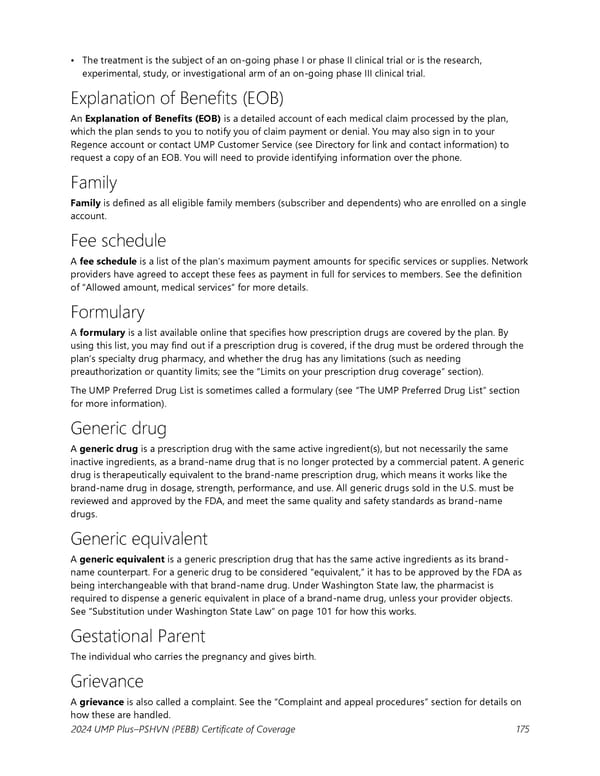• The treatment is the subject of an on-going phase I or phase II clinical trial or is the research, experimental, study, or investigational arm of an on-going phase III clinical trial. Explanation of Benefits (EOB) An Explanation of Benefits (EOB) is a detailed account of each medical claim processed by the plan, which the plan sends to you to notify you of claim payment or denial. You may also sign in to your Regence account or contact UMP Customer Service (see Directory for link and contact information) to request a copy of an EOB. You will need to provide identifying information over the phone. Family Family is defined as all eligible family members (subscriber and dependents) who are enrolled on a single account. Fee schedule A fee schedule is a list of the plan’s maximum payment amounts for specific services or supplies. Network providers have agreed to accept these fees as payment in full for services to members. See the definition of “Allowed amount, medical services” for more details. Formulary A formulary is a list available online that specifies how prescription drugs are covered by the plan. By using this list, you may find out if a prescription drug is covered, if the drug must be ordered through the plan’s specialty drug pharmacy, and whether the drug has any limitations (such as needing preauthorization or quantity limits; see the “Limits on your prescription drug coverage” section). The UMP Preferred Drug List is sometimes called a formulary (see “The UMP Preferred Drug List” section for more information). Generic drug A generic drug is a prescription drug with the same active ingredient(s), but not necessarily the same inactive ingredients, as a brand-name drug that is no longer protected by a commercial patent. A generic drug is therapeutically equivalent to the brand-name prescription drug, which means it works like the brand-name drug in dosage, strength, performance, and use. All generic drugs sold in the U.S. must be reviewed and approved by the FDA, and meet the same quality and safety standards as brand-name drugs. Generic equivalent A generic equivalent is a generic prescription drug that has the same active ingredients as its brand- name counterpart. For a generic drug to be considered “equivalent,” it has to be approved by the FDA as being interchangeable with that brand-name drug. Under Washington State law, the pharmacist is required to dispense a generic equivalent in place of a brand-name drug, unless your provider objects. See “Substitution under Washington State Law” on page 101 for how this works. Gestational Parent The individual who carries the pregnancy and gives birth. Grievance A grievance is also called a complaint. See the “Complaint and appeal procedures” section for details on how these are handled. 2024 UMP Plus–PSHVN (PEBB) Certificate of Coverage 175
 UMP Plus–Puget Sound High Value Network (PSHVN) COC (2024) Page 175 Page 177
UMP Plus–Puget Sound High Value Network (PSHVN) COC (2024) Page 175 Page 177